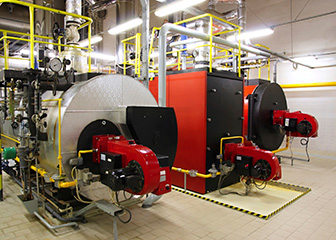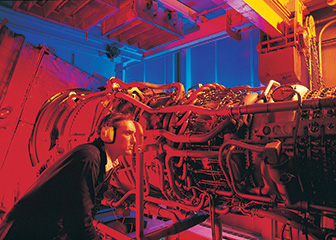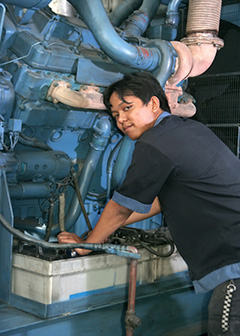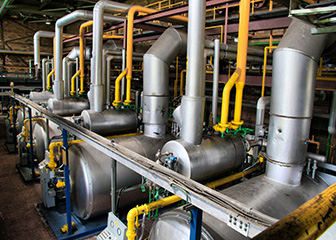How to Become a Stationary Engineer or Boiler Operator About this section

Stationary engineers and boiler operators continue training throughout their career.
Stationary engineers and boiler operators need at least a high school diploma. They typically begin their careers in mechanic or helper positions and are trained on the job by more experienced engineers.
Training
Stationary engineers and boiler operators typically learn their work through long-term on-the-job training. They learn their trade by working as helpers, mechanics, or technicians under the supervision of an experienced engineer. After training and gaining experience, they are eligible to advance to operator and engineer positions within that facility.
Some stationary engineers and boiler operators complete apprenticeship programs sponsored by the International Union of Operating Engineers. Apprenticeships usually last 4 years, include 8,000 hours of on-the-job training, and require 600 hours of technical instruction. Apprentices learn about the operation and maintenance of equipment; controls and balancing of heating, ventilation, and air conditioning (HVAC) systems; safety; electricity; and air quality.
Many employers encourage and pay for skill improvement training for their employees. Experienced stationary engineers and boiler operators update their skills regularly through training, especially when new equipment is introduced or when regulations change.
Licenses
Some state and local governments require licensure for stationary engineers and boiler operators. These governments typically have several classes of stationary engineer and boiler operator licenses. Each class specifies the type and size of equipment the engineer is permitted to operate without supervision.
A top-level engineer or operator is qualified to run a large facility, supervise others, and operate equipment of all types and capacities. Engineers and operators with licenses below this level are limited in the types or capacities of equipment they may operate without supervision.
Applicants for licensure usually must be at least 18 years of age, meet experience requirements, and pass a written exam. Many job openings require that workers be licensed before starting the job, although some jobs may offer apprenticeships. A stationary engineer or boiler operator who moves from one state or city to another may have to pass an examination for a new license because of regional differences in licensing requirements.
Education
Stationary engineers and boiler operators need at least a high school diploma. Students should take courses in math, science, and mechanical and technical subjects.
With the growing complexity of the work, vocational school or college courses may benefit workers trying to advance in the occupation.
Work Experience
Stationary engineers and boiler operators who do not complete a formal apprenticeship or vocational program usually need several years of work experience. Many gain experience working as maintenance helpers, mechanics, or technicians.
Advancement
Generally, stationary engineers and boiler operators advance as they obtain higher class licenses, which allow them to work with larger, more powerful, and more varied equipment. In jurisdictions where licenses are not required, workers usually advance by taking company-administered exams. Due to the growing complexity of the work, continuing education, such as taking vocational school or college courses, can benefit workers who want to advance in the occupation.
Important Qualities
Detail oriented. Stationary engineers and boiler operators monitor intricate machinery, gauges, and meters to ensure that everything is operating properly.
Manual dexterity. Stationary engineers and boiler operators must use precise motions to control or repair machines. They grasp tools and use their hands to perform many tasks.
Mechanical skills. Stationary engineers and boiler operators must know how to use tools and work with machines. They must be able to repair, maintain, and operate equipment.
Problem-solving skills. Stationary engineers and boiler operators must figure out how things work and quickly solve problems that arise with equipment or controls.
Technical skills. Stationary engineers and boiler operators must be able to understand and operate machines and electronic and computer controls.











